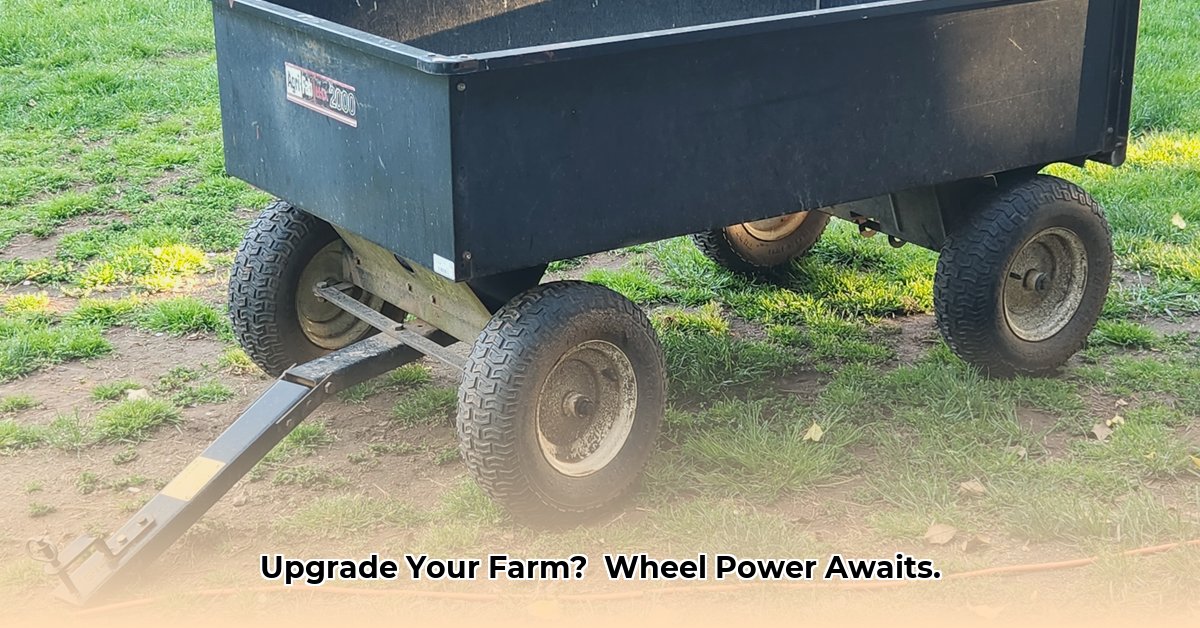
Picking the right cart wheels can significantly impact your farm's efficiency and sustainability. This guide will help you select wheels that optimize your operations, protect your soil, and enhance your bottom line. We'll cover wheel types, soil considerations, and maintenance best practices—all to help you make an informed decision. For more options, check out Tractor Supply's lawn rollers.
Understanding Your Needs: Terrain, Loads, and Budget
Before browsing Tractor Supply's selection, assess your farm's specific requirements. The right wheel is as crucial as the right tool for the job. Ignoring this step can lead to inefficient operations and unnecessary wear and tear.
- Terrain: Rough, rocky terrain demands durable, heavy-duty wheels, while smoother fields might benefit from lighter, more maneuverable options. Clay soils, especially when wet, require wheels designed to minimize compaction.
- Loads: Heavier loads need robust wheels capable of withstanding the stress. Lighter loads allow for more flexibility in wheel selection, potentially reducing costs.
- Budget: Consider the initial cost of the wheels, their expected lifespan, and potential maintenance expenses. A higher upfront investment in durable wheels can often translate to long-term cost savings.
Actionable Step: Complete a farm assessment. Note your terrain type, typical load weights, and budget constraints. This assessment forms the foundation for your wheel selection.
Tractor Supply Cart Wheel Options: A Detailed Comparison
Tractor Supply offers various cart wheel types, each with pros and cons. Selecting wisely improves efficiency and reduces unnecessary expenses.
| Wheel Type | Advantages | Disadvantages | Ideal Use Cases |
|---|---|---|---|
| Heavy-Duty Steel Wheels | Exceptional strength, longevity, heavy loads | Soil compaction, difficult maneuverability | Rocky terrain, consistently heavy loads |
| Pneumatic Rubber Wheels | Excellent traction, shock absorption, smooth ride | Potential punctures, requires maintenance | Diverse terrains, varying load requirements |
| Light-Duty Plastic Wheels | Lightweight, ease of use, affordability | Lower durability, shorter lifespan | Flat terrain, light loads, infrequent use |
Quantifiable Fact: Studies show that properly inflated pneumatic tires can reduce soil compaction by up to 30% compared to solid steel wheels.
Actionable Step: Review the table above and evaluate each wheel type's suitability based on your farm assessment.
Step-by-Step Guide to Choosing the Perfect Wheels
Selecting the ideal cart wheels is a strategic process. Follow these steps to ensure your purchase aligns with your needs and budget:
- Analyze Terrain and Loads: Refer to your farm assessment to clarify your terrain and typical load weights.
- Select Wheel Material: Choose steel for heavy-duty needs, rubber for versatility, and plastic for light-duty applications.
- Verify Weight Capacity: Ensure the wheel's weight capacity exceeds your heaviest anticipated load. Safety should always be prioritized.
- Explore Tractor Supply's Inventory: Visit their website or store to examine available options and compare prices.
- Inspect Wheels Thoroughly: Check for cracks, damage, or manufacturing defects before purchasing.
- Proper Installation and Maintenance: Correct installation and regular maintenance (lubrication, pressure checks) extend wheel lifespan.
Data-backed Rhetorical Question: Wouldn't investing in high-quality wheels, despite a potentially higher upfront cost, significantly reduce long-term replacement and repair expenses?
Maintaining Your Wheels: Sustainability and Longevity
Regular maintenance significantly increases wheel lifespan, reduces replacement costs, and contributes to a more sustainable farming practice.
- Regular Cleaning: Remove mud and debris to prevent corrosion and premature wear.
- Bearing Lubrication: Regular lubrication minimizes friction and extends bearing life.
- Tire Pressure Checks (Pneumatic Wheels): Maintain proper inflation to optimize traction and reduce compaction.
Expert Quote: "Proper wheel maintenance is not just about extending the life of your equipment; it’s a key component of sustainable farming practices," says Dr. Emily Carter, Agricultural Engineer at the University of California, Davis.
Actionable Step: Develop a maintenance schedule for your cart wheels, including regular cleaning, lubrication, and tire pressure checks. This simple routine significantly extends their usable life.
Minimizing Soil Compaction: A Broader Perspective
Soil compaction significantly impacts crop yields. Choose wheels and implement practices that minimize this issue.
Pivotal Point 1: Tire selection significantly influences soil compaction. Wider tires at lower pressure distribute weight more effectively.
Pivotal Point 2: Regular soil testing helps identify compaction levels and guides the selection of appropriate mitigation strategies.
Pivotal Point 3: Cover cropping improves soil structure, increasing its resistance to compaction over time.
By following this guide and prioritizing careful wheel selection and maintenance, you can optimize your farm's efficiency and contribute to environmental sustainability. The choice is yours—choose wisely!